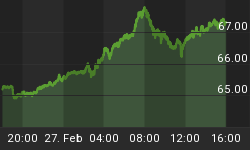
All the well followed economic cycles such as Martin Armstrong's "Economic Confidence Model", Harry Dent's 39 Year Generational Cycle - 35 Year Geo-Political Cycle - 10 Year Boom-Bust Cycle or the Kondratieff Cycle all point down through early 2020. As Gordon T Long and Charles Hugh Smith examine in this 30 Minute video it is fundamentally about shifting generation behavioral sentiment and a cyclical change in "mood".
The September 1992 issue of The Elliott Wave Theorist described these cyclical economic oscillations:
Major bear markets are accompanied by a reduction in the size of people's unit of allegiance, the group that they consider to be like themselves. At the peak, there is a perceived brotherhood of men and nations. ... In other words, at a peak, it's all 'we'; everyone is a potential friend. At a bottom it's all 'they'; everyone is a potential enemy. When times are good, tolerance is greater and boundaries weaker. When times are bad, intolerance for differences grows, and people build walls and fences to shut out those perceived to be different.
Historian Peter Turchin adds to this thinking in his new book Ages of Discordwhere he illustrates how historical cycles are about social disintegration and integration. They are about three primary forces all of which we have today and the current economic cycles reflect,
1. An over-supply of labor that suppresses real (inflation-adjusted) wage,
2. An overproduction of essentially parasitic Elites
3. A deterioration in central state finances (over-indebtedness, decline in tax revenues, increase in state dependents, fiscal burdens of war, etc.)
Investors need to understand and prepare for the fact we are only at the beginning of this economic shift downward in the trend of the cycles cited above.  The already failing Debt Super Cycle will end as a consequence.
Brexit - Trump - Italian Referendum -- It's Only Beginning!

The Italian Constitutional Referendum on December 4th, 2016 is potentially as impactful as BREXIT and the shock of Trump being elected President of the USA.
Both can be viewed as potential rejections of the status quo and potentially why the Italian Referendum vote could fail, resulting in toppling the Italian government and opening the door for the anti-EU, Anti-establishment 5 Star party led by former comedian and political satirist Beppi Brillo. Brillo and his 5 Star movement is the epitome of the anti-establishment candidate.
There is also a steady sequential set of highly charged political events throughout Europe coming in 2017 which portends of mounting political instability and social unrest.
All of this is about Political Polarization which has exploded since 2000 which is explored in the video. It is about how a Negative Social Mood shift has polarized political positions and how majorities now have deeply negative views of other parties & their views. There is an increasing  breakdown in cooperation and an intolerance of other views.
There is a "Dis-integrative Winter" stage to all of our cycles.
A Reversal in The Globalization Trend
The June 2008 issue of Progress in Socionomics reported:
Scientist predicts a reversal of the trend toward globalization. Dr. John L. Casti's presentation at the Cycles and Patterns in Business and Finance Conference depicted and expanded upon Elliott Wave International's forecast of a reversal in the trend toward globalization.

The Roadmap Since 2007
Gordon T Long explains how he has viewed this evolution since the GFC (Great Financial Crisis) as we moved from a Financial Crisis to the inevitable Political Crisis as a result of the social contract breaking down.

The Global-Political Space: Anti-Globalization - Anti Status Quo - Anti-Establishment
He also illustrates how financialization and its core products are involved and how they play into this breakdown of the "Global-Political" space with growing Anti-Globalization, Anti-Status Quo, Anti-Establishment populist sentiment.

A Fuse, an Explosive and The Igniting Catalyst
Gordon T Long postulates by summarizing that all of the above leads to and further assists in driving two key long term structural changes now underway:
First, there is now a clear shift in attitude within the electorate of the Developed Economies towards Anti-Globalization. Existing Free Trade Agreements, Tariffs and Protectionism are all now on the table.
Secondly, the Debt Super Cycle is coming to an end. It is the fuse that will ignite this combustible mixture. The explosive mixture is about the Fiat paper reserves underpinning the global economic system which are presently built on failing wealth creation which is  required to maintain the collateral values  supporting the pyramided debt leverage levels through financial "gimmicks" such as rehypothecation. The approximate $600T derivative SWAPs market is the explosive within this mixture.
The catalyst to ignite the fuse will likely be correcting financial markets that are historically highly over-valued, disconnected from fundamentals and can only be described as in the third and final central bank bubble of the new millennium.
Investors need to focus on the two key long term structural changes now underway which are going to ignite destructive global dislocations through early 2020. To better understand why this is going to occur we need to place them in context by first examining the major economic cycles currently underway.
VIEW VIDEO - 30Â Minutes
Signup for notification of the next MATASII Macro Insights















